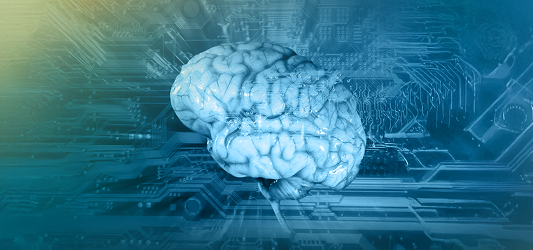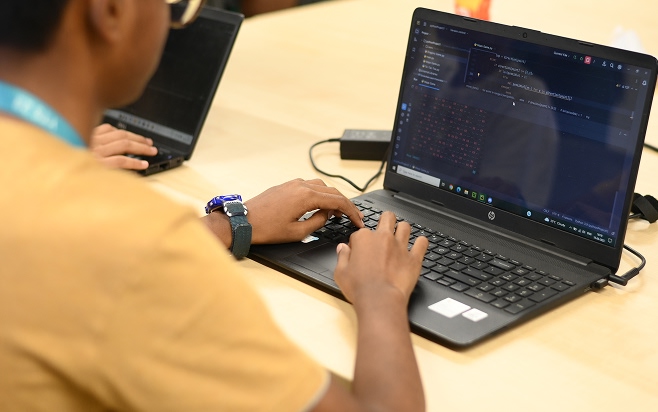Reimagining AI curriculum for industry
MS in AI at Plaksha is a rigorous program designed by experts, backed by industry, reimagining tech and AI education in India. The program has a strong emphasis on AI fundamentals with a focus on their application in industry projects, smarter business decisions and beyond. At Plaksha, the curriculum is structured around three key dimensions: Core AI, Deploy AI, and Lead AI. Together, these pillars create a program that is both technically rigorous and industry relevant, preparing students to apply AI at scale while shaping them into leaders who can bridge technology and business.

Core AI

Deploy AI

Lead AI
The MS in AI program at Plaksha University will commence in the first week of Aug 2026 and conclude in July 2027. The program is structured across five terms, including an Industry Immersion Project. A detailed breakdown of the course structure is provided below.
|
AI fundamentals
|
Explore the history, breakthroughs, and future trajectories of AI, understanding how core concepts like search, optimization, and knowledge representation underpin today’s intelligent systems.
Python programming
Master Python as the lingua franca of AI, with emphasis on vectorized computing, data manipulation, and integrating with AI-specific libraries like PyTorch and TensorFlow.
Mathematics and statistics for AI
Dive into linear algebra, probability, and optimization—framed through practical use in deep learning, Bayedsian models, and stochastic gradient descent.
Machine learning
Move beyond traditional algorithms to advanced ensemble models, semi-supervised learning, and model evaluation strategies that scale to enterprise data.
Database concepts
Understand how relational and NoSQL systems manage AI workloads, while exploring modern data lakes, distributed storage, and query optimization for ML pipelines.
Advanced data structures and algorithms
Sharpen computational thinking for AI with graph algorithms, hash functions, and time-complexity analysis, applied to large-scale data processing and real-world AI systems.
Foundations of AI and neural networks
Study perceptrons to transformers, with a strong grounding in activation functions, optimization, and architectures that power modern neural systems.
CNN and applications of CV
Learn convolutional architectures, attention-based vision models, and multimodal CV techniques with real-world applications in medical imaging, autonomous driving, and video analytics.
|
AI advanced
|
Delve into reinforcement learning, graph neural networks, and emerging paradigms like neuro-symbolic AI and foundation models beyond LLMs.
Gen AI and LLMs
Unpack the architecture and training of large language models, along with prompting strategies, fine-tuning techniques, and enterprise applications across sectors.
LLMs and Agentic AI
Explore advanced LLM applications, prompt engineering, and agentic AI systems that can reason, plan, and act autonomously. The course focuses on building and deploying LLM-powered agents for complex, real-world workflows.
Advanced AI Retrieval and Recommendation Systems
Dive into intelligent retrieval and recommendation systems using embeddings, vector databases, and hybrid search techniques. Learn how modern AI systems personalize, rank, and retrieve information at scale.
|
Business innovation
|
Link AI strategy with competitive advantage by identifying disruption opportunities, new business models, and value creation through data-driven products.
ML to make better business decisions
Harness predictive and prescriptive analytics to transform decision-making under uncertainty, leveraging causal inference and simulation.
Digital transformation for companies
Understand how AI redefines supply chains, customer engagement, and organizational processes, with case studies from industry leaders.
Financial planning for AI
Evaluate ROI, TCO, and scalability of AI initiatives, equipping leaders to build financially viable and sustainable AI-driven strategies.
|
Industry Immersion Project
|
The five-month Industry Immersion Project is an integral component of the MS in AI program, designed to connect academic learning with real-world application. Partner companies propose projects addressing business transformation, digital innovation, or value creation through AI. Students work in teams of three to four, following a hybrid engagement model and guided by dual mentorship from Plaksha faculty and industry professionals. They analyze problems, address data challenges, apply AI methods, and develop deployment-ready solutions that create measurable impact.
|
Electives
|
AI in Healthcare
Build diagnostic models, personalized treatment systems, and predictive health analytics while navigating strict regulatory landscapes.
Human-computer interaction
Design user-centered AI systems, bridging cognitive science, UX, and multimodal interaction for next-gen human-tech collaboration.
AI in finance
Design and deploy advanced AI models for credit risk, fraud detection, and algorithmic trading while integrating considerations of regulation, governance, and ethical use in financial systems.
Learning outcomes
Learning outcomes
- Demonstrate a solid understanding of AI fundamentals.
- Design and build industry-grade AI models for real world applications.
- Apply machine learning operations (MLOps) to manage AI systems at scale.
- Deploy AI-ML models effectively on cloud platforms.
- Apply AI to support strategic business decision-making.
- Develop and deliver comprehensive end-to-end AI solutions.
Learning outcomes


